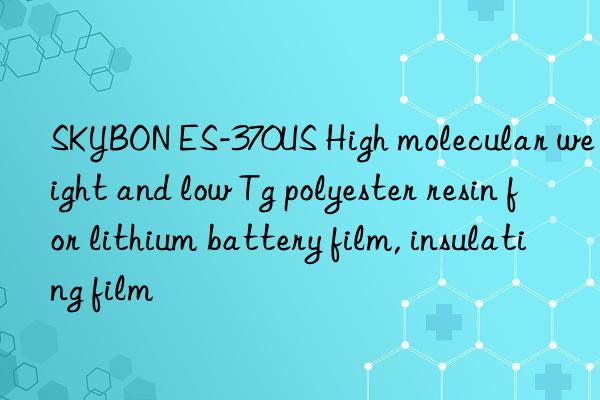
Products Description
SKYBON® ES-370US is a polyurethane with high molecular weight and low glass transition temperature (Tg) Modified polyester with extra hydrolysis resistance.
This product is suitable for adhesives with excellent flexibility and adhesion on various substrates. Compared with traditional low Tg polyesters, ES-370US exhibits extremely high hydrolysis resistance under high temperature and high humidity conditions, even under hot water immersion conditions. Based on this super hydrolysis resistance, this product is strongly recommended for special adhesives that require long-term moisture and heat resistance, such as aluminum-plastic films for lithium batteries, insulating films, and special metal laminations.
SKYBON® ES-370US can be formulated with other medium to high Tg solventborne polyesters to control tack and/or cohesive strength.
Features
Excellent flexibility and adhesion based on high molecular weight and low Tg.
- High bonding strength with PA, PET, aluminum substrates
-Excellent hydrolysis resistance at high temperature
-Deep drawing
- Contains -OH, -NH2 functional groups
Products Parameters
|
Product parameters |
unit/test method |
ES-370US (in MEK) |
|
Appearance |
|
colorless to yellowish transparent liquid |
|
solid content |
wt% |
30 |
|
viscosity |
(Brookfield, cps, @30wt%) |
> 400 |
|
Mn |
(number average molecular weight, GPC, THF) |
30,000 ~35,000 |
|
Mw |
(weight average molecular weight, GPC, THF) |
150,000 ~18,000 |
|
Tg |
(℃,DSC) |
18 ~ 22 |
|
Intrinsic Viscosity IV |
(dl/g, OCP at 35℃)about 10um |
|
| dry film thickness | 3 um | |
| Dry conditions | 80℃ X 30 seconds | |
| Heat pressing conditions | 150℃ & 6 MPa pressure | |
| aging condition | 60℃X 5 days | |
|
Adhesion
(N/15mm)
|
@R.T | 6 ~ 7 |
| @ 120℃ | 2.8 | |
| Deep drawing | Erichsen test (mm) | 8~ 9 |
Description of experimental materials: -Aluminum foil: DI Dong il (aluminum-plastic film grade) - Nylon film: Hyosung (BC 11 grade for aluminum plastic film) -Curing agent: Hardening of A-Kyong agent (AK-75; HDI trimer, TMP adduct) the the Erichsen test tensile properties

 微信扫一扫打赏
微信扫一扫打赏

